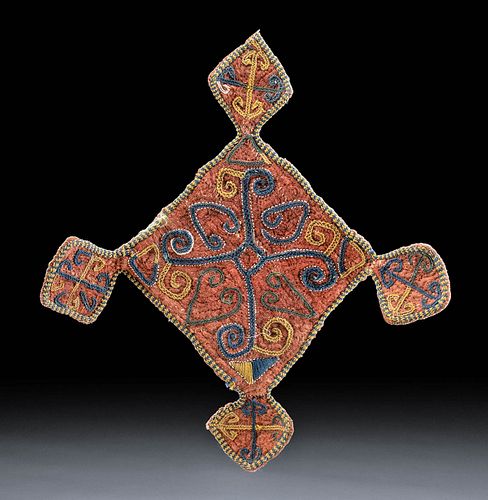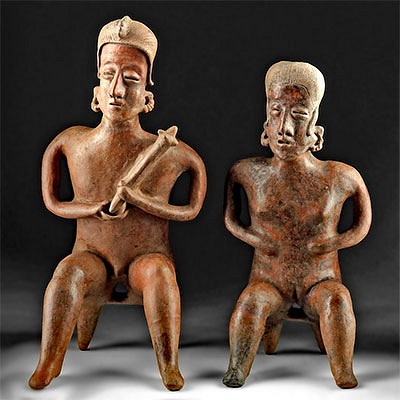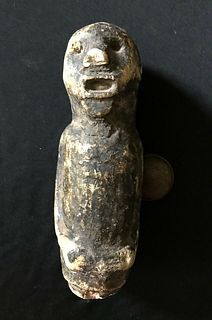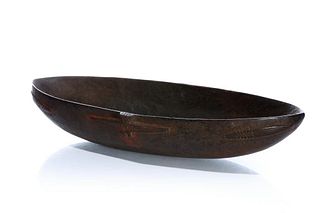19th C. Central Asia Uzbek Wool & Cotton Suzani Textile
Lot 77
About Seller
Artemis Fine Arts
686 S Taylor Ave, Ste 106
Louisville, CO 80027
United States
Selling antiquities, ancient and ethnographic art online since 1993, Artemis Gallery specializes in Classical Antiquities (Egyptian, Greek, Roman, Near Eastern), Asian, Pre-Columbian, African / Tribal / Oceanographic art. Our extensive inventory includes pottery, stone, metal, wood, glass and textil...Read more
Estimate:
$600 - $900
Absentee vs Live bid
Two ways to bid:
- Leave a max absentee bid and the platform will bid on your behalf up to your maximum bid during the live auction.
- Bid live during the auction and your bids will be submitted real-time to the auctioneer.
Bid Increments
| Price | Bid Increment |
|---|---|
| $0 | $25 |
| $300 | $50 |
| $1,000 | $100 |
| $2,000 | $250 |
| $5,000 | $500 |
| $10,000 | $1,000 |
| $20,000 | $2,500 |
| $50,000 | $5,000 |
| $100,000 | $10,000 |
| $200,000 | $20,000 |
About Auction
By Artemis Fine Arts
Mar 25, 2021
Set Reminder
2021-03-25 10:00:00
2021-03-25 10:00:00
America/New_York
Bidsquare
Bidsquare : CLEARANCE Antiquities | Ethnographic Art
https://www.bidsquare.com/auctions/artemis-gallery/clearance-antiquities-ethnographic-art-6663
Featuring discounted pricing on Asian art, Classical antiquities from Egypt, Greece, Italy, and the Near East...plus Pre-Columbian, Tribal, Russian Icons, Spanish Colonial, Fine Art, more! Artemis Fine Arts info@artemisfinearts.com
Featuring discounted pricing on Asian art, Classical antiquities from Egypt, Greece, Italy, and the Near East...plus Pre-Columbian, Tribal, Russian Icons, Spanish Colonial, Fine Art, more! Artemis Fine Arts info@artemisfinearts.com
- Lot Description
**First Time At Auction**
Central Asia, Tajikistan, Uzbekistan or Kazakhstan, Uzbek people, ca. 19th century CE. A wonderful and vibrant panel known as a suzani, made from felted wool and cotton designs of geometric and abstract forms. The textile is symmetrically constructed with a central square featuring four radiating arms of embroidery with additional curvilinear embroidery patterns upon a red ground. The embroidery threads are brightly dyed with yellow, blue, and green hues. Four addition square panels are attached to each corner. A brown felt applique is whip stitched to the verso of the piece. Textile panels and hangings were made by the nomadic people of the steppes for decoration and as wedding gifts. Brides and their mothers would hand stitch such pieces to present to the groom. A lovely example with great preservation of colors! (Size: 16.5" L x 16.5" W (41.9 cm x 41.9 cm)
Traditionally suzanis were created by Central Asian brides as part of their dowry to be presented to their groom on the wedding day as an esteemed token of devotion to their betrothed. The word suzani is derived from the Persian "suzan" which translates as needle. The fine art of creating such textiles is known as "suzandozi" or needlework. According to scholars, the oldest surviving suzanis extend to the late 18th and early 19th centuries; however, they were most likely initially created long before. The early 15th century writings of one Ruy Gonzales de Clavijo, the Castillian ambassador to the court of Timur (Tamerlane), includes detailed descriptions of embroideries that scholars believe to be forerunners of suzani textiles!
Provenance: private New Jersey, USA collection
All items legal to buy/sell under U.S. Statute covering cultural patrimony Code 2600, CHAPTER 14, and are guaranteed to be as described or your money back.
A Certificate of Authenticity will accompany all winning bids.
We ship worldwide and handle all shipping in-house for your convenience.
#158502Fraying and wearing of threads. Discoloration and fading of red pigments. Raised embroidery is well preserved!Condition
- Shipping Info
-
All shipping is handled in-house for your convenience. Your invoice from Artemis Gallery will include shipping calculation instructions. If in doubt, please inquire BEFORE bidding for estimated shipping costs for individual items.
-
- Buyer's Premium



 EUR
EUR CAD
CAD AUD
AUD GBP
GBP MXN
MXN HKD
HKD CNY
CNY MYR
MYR SEK
SEK SGD
SGD CHF
CHF THB
THB










